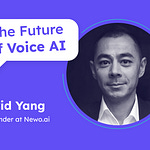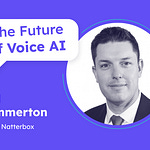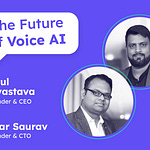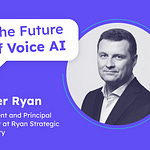In the Future of Voice AI series of interviews, I ask three questions to my guests:
- What problems do you currently see in Enterprise Voice AI?
- How does your company solve these problems?
- What solutions do you envision in the next 5 years?This episode’s guest is Zach Koch, CEO and Co-Founder of Fixie.ai.
Zach Koch is the CEO and Co-Founder at Fixie.ai. He’s led product teams for some of the most used pieces of software in the world (Chrome browser, Android, Shopify). Before that, he spent years designing and building experiences on the web for startups.
Founded in 2022, Fixie.ai is building the next generation of real-time AI Voice Agents that can communicate as naturally as humans do. Through Ultravox, its open-source speech language model, and Ultravox Realtime, a comprehensive platform for building and scaling AI Voice Agents, Fixie.ai is tackling the messy realities of natural conversation – from interruptions to group dynamics and emotional understanding. As AI moves beyond simple text interactions, Fixie.ai is creating the technology stack needed to enable AI systems that can fully participate in the rapid, fluid exchanges that drive human progress.
Recap Video
Takeaways
Fixie is building AI that can communicate as naturally as humans.
Open-source AI like Fixie’s Ultravox puts advanced tools in developers' hands, challenging big tech.
Real-time voice systems need to feel natural and real, not just fast.
AI must move beyond transcripts and learn directly from speech.
Feeding audio into AI directly makes it smarter and faster.
Voice AI will evolve from note-taking to being a true teammate.
AI needs to handle tone, context, and messy conversations like humans do.
Open-source tools build trust and give companies more control.
AI still struggles with conversations involving multiple people.
The future of voice AI is about creating richer conversations, not just quicker replies.
Companies that focus on voice will lead the next tech wave.
Open-source AI drives trust and customization, a lifeline for regulated industries.
Today’s voice AI lacks true speech understanding, exposing the gap between hype and reality.
Focusing only on speed risks ignoring the deeper problem: creating trust in machine speech
Smarter AI will unlock game-changing tools like conversational robots and personal assistants.
Multi-speaker AI-driven meetings are closer than we think but need lacks in contextual understanding.
Trust will hinge on AI’s ability to identify noise from nuance, especially in chaotic environments.
Future AI-powered collaboration will redefine teamwork by blending human intuition with machine logic.
Voice AI’s future isn’t just about solving problems—it’s about becoming a natural extension of human thought.











